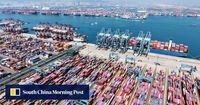The 137th edition of the China Import and Export Fair, commonly known as the Canton Fair, kicked off on April 15, 2025, in Guangzhou, marking a significant milestone with over 30,000 export exhibitors participating for the first time in the event's history. This year’s fair reflects the resilience and adaptability of China’s export sector amid ongoing global challenges.
As the largest trade fair in China, the Canton Fair has long been a pivotal platform for international trade, attracting buyers and sellers from around the world. The bustling atmosphere at the fairgrounds in Guangdong Province was palpable, with foreign buyers engaging in business talks and exploring a wide array of products ranging from electronics to textiles.
Notably, the fair has come at a crucial time as exporters face increasing pressures from global trade disruptions and rising insolvency rates across Asia. The Hong Kong Export Credit Insurance Corporation (HKECIC) recently announced a set of temporary support measures aimed at bolstering exporters, effective through June 30, 2026. These initiatives include an extension of complimentary pre-shipment coverage for small businesses and a 50% discount on premiums related to pre-shipment risks for exporters not covered by the Small Business Policy.
With global insolvencies projected to rise by 6% in 2025 and another 3% in 2026, the situation remains precarious for many firms. According to the Global Insolvency Report from Allianz Trade, regions such as Asia-Pacific have experienced significant increases in insolvency cases, with Singapore leading the charge at a staggering 46% rise in 2024. Following closely are Australia with 41%, New Zealand at 40%, Hong Kong with 25%, South Korea at 17%, and Japan at 15%.
In light of these challenges, local governments in China are stepping up efforts to support exporters. Communist Party chiefs and mayors from coastal provinces have embarked on tours to visit companies, emphasizing the need for tailored policies to stabilize and expand trade. For instance, on April 15, Zhang Wenjie, the mayor of Wenzhou in Zhejiang Province, highlighted the importance of policies to “stabilise, expand, adjust and optimise” trade and exports.
Similarly, Shi Zhijun, the party secretary of Jiangsu’s Huaian city, visited a local industrial estate on April 17 to discuss the challenges faced by businesses. He urged officials to provide maximum support to help companies navigate these difficult times. Meanwhile, on April 9, Kong Fanping, the mayor of Weihai in Shandong Province, visited a local hi-tech zone, encouraging tech companies to explore emerging markets.
As these local leaders engage with businesses, they are not only addressing immediate concerns but also promoting long-term strategies for market expansion. On April 8, Chen Shaowang, the mayor of Dalian in Liaoning Province, visited foreign-owned companies, urging them to maintain confidence in China and to expand their operations within the country.
The Canton Fair serves as a vital platform for these discussions, showcasing innovative products and technologies that can help exporters adapt to changing market conditions. Attendees had the opportunity to experience cutting-edge technology, including virtual reality products, which are becoming increasingly popular in various sectors.
In addition to the Canton Fair, the HKECIC's measures reflect a broader recognition of the challenges facing exporters. The adjustments in premium rates for emerging markets like Vietnam, Indonesia, Thailand, and Malaysia aim to align these rates with those for traditional markets, thereby encouraging regional market expansion while alleviating insurance costs.
As the global economy grapples with elevated interest rates and constrained access to credit, the focus on supporting exporters has become more critical than ever. The recent study by QBE indicates that many small and medium-sized enterprises (SMEs) in Hong Kong and Singapore remain vulnerable to risks they often do not insure against. Despite facing rising costs and declining profitability, a significant number of firms lack coverage for essential risks such as income loss from business interruptions and equipment failure.
Meanwhile, Central Huijin Investment Ltd, a unit under China’s sovereign wealth structure, has pledged liquidity support to stabilize financial markets amid the potential for new U.S. tariffs. This move, along with the National Financial Regulatory Administration's approval to increase the allocation of insurance capital toward equity investments, aims to reinforce the role of institutional investors in mitigating market shocks.
As the Canton Fair unfolds, it stands as a testament to the resilience of China’s export sector and the collaborative efforts of local governments and businesses to navigate the complexities of the current global trade environment. The fair not only highlights the diversity and innovation within Chinese exports but also underscores the importance of adaptability in the face of economic uncertainties.
Looking ahead, the commitment from both government and industry stakeholders will be crucial in ensuring that exporters can thrive in a challenging landscape. The initiatives announced by the HKECIC and the proactive measures taken by local officials signal a concerted effort to bolster the export economy and support businesses in their quest for new opportunities.


